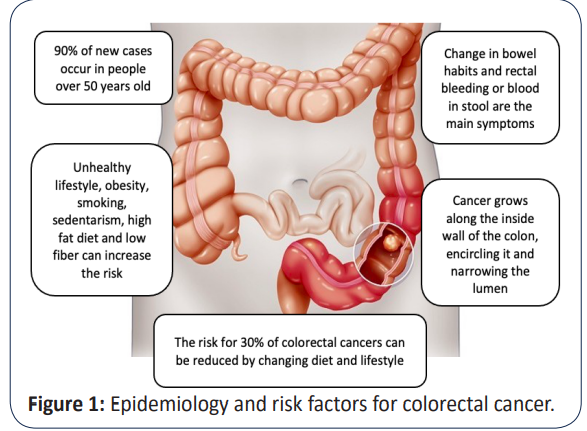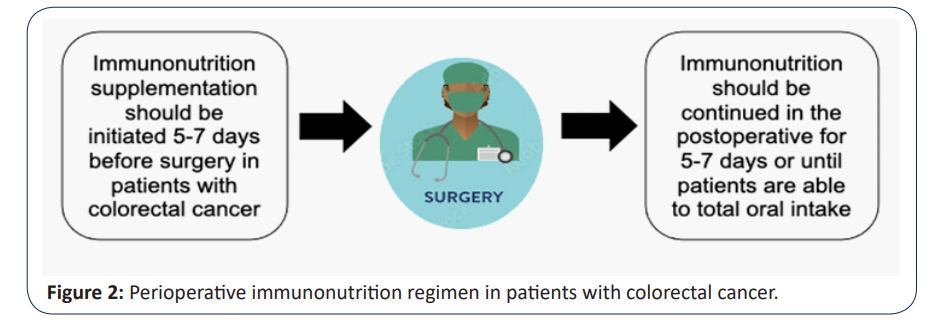This is a republication of the papers below, with the title above, focusing on the topic in question.
Edited by
Joaquim Cardoso MSc.
Health Transformation Institute
continuous transformation for universal health
Cancer Unit
July 6, 2022
Perioperative Immunonutrition in Patients with Colorectal Cancer
Journal of Oncology
Thiago JM Gonçalves1,2*; Sandra EAB Gonçalves1,3
Jun 22, 2022
Abstract
Colorectal Cancer (CRC) is one of the most diagnosed cancers among men and women worldwide.
- The incidence of CRC has been rising due to risk factors such as a sedentary, obesity, high fat diet and unhealthy lifestyle.
- Surgical treatment for excision of the primary tumor represents 80% of all CRC treatments.
For this procedure, patients need to be prepared to withstand surgical aggression, regardless of their nutritional status.
- To this end, studies have demonstrated the use of nutritional formulas with Immunonutrients (IN), a mix of omega-3 fatty acids, glutamine, arginine, and nucleotides,
- … which modulate the surgical inflammatory response, reducing the risk of infectious complications (i.e., surgical site infection) and non-infectious (i.e., anastomotic dehiscence or enteric fistulas).
- In addition, IN has been reducing hospital length of stay (LOS) and overall hospital costs.
Recent studies have shown that these IN formulations
- have better results in CRC patients if given 5–7 days before surgery and
- restarted after surgery for an additional 5–7 days or until patients are able to resume oral intake, covering at least 60% of their requirements.
Excerpt from the publication:
Braga et al. demonstrated that IN supplementation induced an immune response, increased intestinal microperfusion and oxygenation [22].
Waitzberg et al. showed the beneficial effects of IN supplementation on clinical outcomes in elective surgery patients with significant reductions in infectious complications and LOS.
Their analysis of postoperative outcomes in surgical patients suggests that the best outcomes were observed when IN supplementation was supplemented during the preoperative period, generally 0.5–1.0 l/day for 5–7 days before surgery [28].
Selected images


About the authors & affiliations
Thiago JM Gonçalves1,2*;
Sandra EAB Gonçalves1,3
1 Nutrology and Clinical Nutrition, Hospital Sancta Maggiore, Prevent Senior Institute, São Paulo, Brazil.
2 Brazilian Society of Parenteral and Enteral Nutrition (BRASPEN), São Paulo, Brazil.
3 Oncology and Hematology Division, Hospital Israelita Albert Einstein (HIAE), São Paulo, Brazil
RELATED ARTICLES
Postsurgical infections are reduced with specialized nutrition support
Springer Link
Dan L Waitzberg 1, Hideaki Saito, Lindsay D Plank, Glyn G Jamieson, Palepu Jagannath, Tsann-Long Hwang, Juan M Mijares, David Bihari
Abstract
Objective:
The objective was to examine the relationship between pre-, peri-, and postoperative specialized nutritional support with immune-modulating nutrients and postoperative morbidity in patients undergoing elective surgery.
Methods:
Studies were identified by searching MEDLINE, review article bibliographies, and abstracts and proceedings of scientific meetings. All randomized clinical trials in which patients were supplemented by the IMPACT formula before and/or after elective surgery and the clinical outcomes reported were included in the meta-analysis. Seventeen studies (n=2,305), 14 published (n=2,102), and 3 unpublished (n=203), fulfilled the inclusion criteria. Ten studies (n=1,392) examined the efficacy of pre- or perioperative IMPACT supplementation in patients undergoing elective surgery, whereas 7 (n=913) assessed postoperative efficacy. Fourteen of the studies (n=2,083) involved gastrointestinal (GI) surgical patients. Postoperative complications, mortality, and length of stay in hospital (LOS) were major outcomes of interest.
Results:
- IMPACT supplementation, in general, was associated with significant (39%-61%) reductions in postoperative infectious complications
- and a significant decrease in LOS in hospital by an average of 2 days.
- The greatest improvement in postoperative outcomes was observed in patients receiving specialized nutrition support as part of their preoperative treatment.
- In GI surgical patients, anastomotic leaks were 46% less prevalent when IMPACT supplementation was part of the preoperative treatment.
Conclusion:
- This study identifies a dosage (0.5–1 l/day) and duration (supplementation for 5–7 days before surgery) of IMPACT that contributes to improved outcomes of morbidity in elective surgery patients, particularly those undergoing GI surgical procedures.
- The cost effectiveness of such practice is supported by recent health economic analysis.
- Findings suggest preoperative IMPACT use for the prophylaxis of postoperative complications in elective surgical patients.
IMPACT supplementation, in general, was associated with significant (39%-61%) reductions in postoperative infectious complications
and a significant decrease in LOS in hospital by an average of 2 days.












